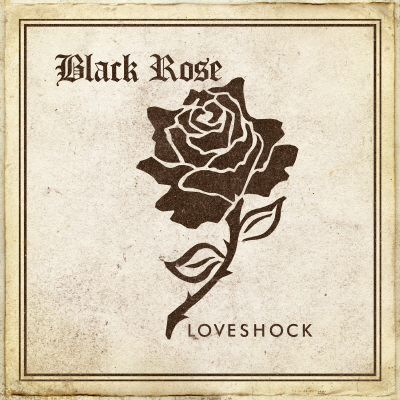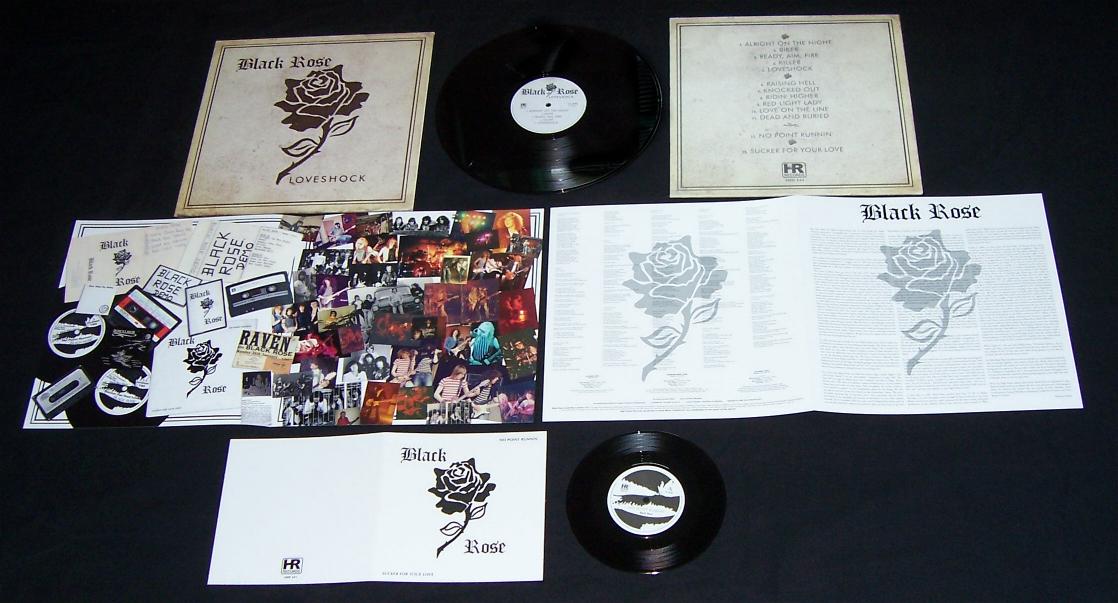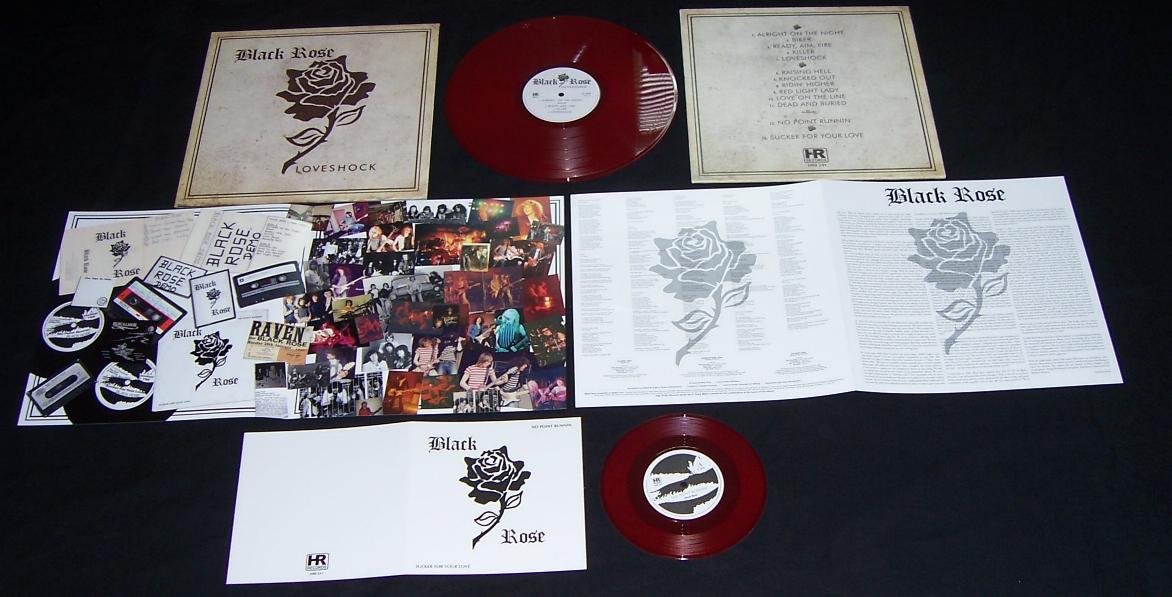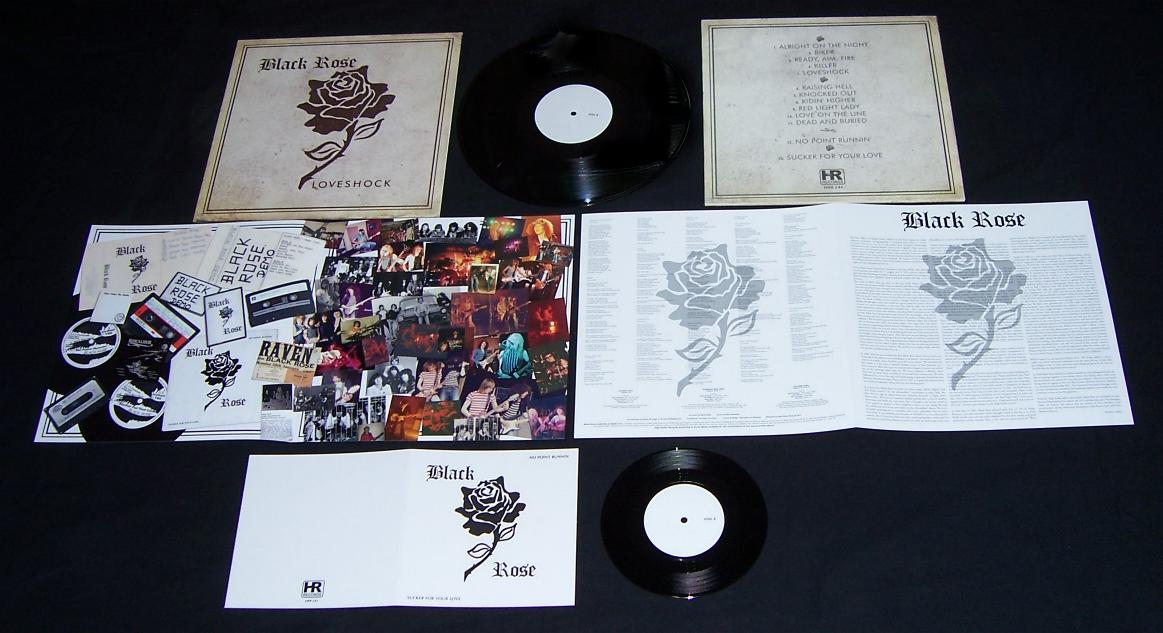 | ||||
| BLACK ROSE - Loveshock LP+7" | |
HRR 241, ltd 500, 150 x red vinyl + 350 x black vinyl, 4 page insert, bonus 7" | |
| Side A -Alright on the Night -Biker -Ready, Aim, Fire -Killer -Love Shock Side B -Raising Hell -Knocked out -Ridin´ Higher -Red Light Lady -Love on the Line -Dead and Buried 7” Single -No Point Running´ -Sucker For Your Love | |
| SOLD OUT! | |
The New Wave Of British Heavy Metal was far from being one single coherent movement. Geographically it stretched from John O' Groats to Land's End so to say. Or, if you prefer, from Scotland (Edinburgh's Holocaust) to the Channel Islands (Jersey's own Legend). There was even a band active on Gibraltar, namely the fantastic Oracle (in case you really want to stretch things). And we all know that musically it also was a very diverse affair. In the end, only Iron Maiden became superstars (some would argue Def Leppard as well). Saxon endured. The Tygers Of Pan Tang had their fifteen minutes of fame. Most of the bands, however, released just one single and then disappeared forever.
Not so Black Rose! Formed in Cleveland in the late 1970's, they showed a lot of promise, recorded two 7" singles, two 12" EP's and two albums but split up before breaking through to the mainstream market. It is a long story. Band founder Steve Bardsley (guitar and lead vocals) will take us on his journey.
The roots of Black Rose go back to the year 1976. That's when Steve recruited school mates Mark Eason (on drums) and Marty Rajn (on bass) to form the band ICE (they changed their name to Black Rose around 1980). As one could guess, the name Black Rose bears some relation to the Thin Lizzy album of the same title but it was never meant to be a direct tribute: “No not at all. I mean we were all Lizzy fans but that wasn't the reason we chose the name. I think we just wanted a change, liked the name of that album and thought, yeah, that would be a good name for a band. None of us were very good musicians in the early days and we used a lot of home made equipment, which must have sounded crap … but it got us started.” Soon they penned their own numbers and played the local pub circuit. But in 1981 Black Rose encountered some serious line up changes. Only Marty Rajn on bass and Steve Bardsley remained as the nucleus of Black Rose. He explains: “We all used to go to this local bar in Saltburn called The Zetland and on Sundays they had a live music night. One night there were these two guys on supporting a band: Kenny Nicholson on electric guitar and his mate Andy Parker on acoustic guitar. They were playing this weird kind of guitar duo set where Kenny was thrashing the fuck out of his guitar and we all thought, wow, this guy is good. After the show we got talking to him and asked him if he fancied playing with us in the band, to which he said yes and we became a four-piece. Our original drummer Mark was losing interest and Kenny knew this lad called Charlie Mack, who was an amazing drummer and later went on to be in Samson. We got him in to replace Mark and this was the first real Black Rose line up.”
In 1981, this line up recorded the first Black Rose demo (all six tracks can be found on the album you are holding in your hands). This demo was never sold to the public. Steve Bardsley goes into more detail: “We recorded the first demo as a live take at Impulse Studios, home of Neat Records, so it was a very raw affair but it got us noticed and a couple of tracks even ended up on the Kerrang! charts play list. We never released it officially (until now) but it's been freely available to download from various sites. We were influenced by a lot of the big rock bands going at that time, bands like Iron Maiden, Motörhead, Judas Priest and AC/DC, so I guess the material was a mix of those influences along with my own writing style.”
As a next step, Black Rose recorded two more songs ("Ridin' higher" and "No Point runnin'") for the "Roxcalibur" compilation in early 1982. But they did not sign an album deal with Guardian Records 'n' Tapes. Steve knows why: “We went to Guardian studios initially just to record another demo tape and while we were there, Terry Gavaghan, the owner, asked us if we wanted to appear on this compilation album he was doing. We said yes and he put two of the new tracks on the 'Roxcalibur' album. We never recorded anything else at Guardian and I can't remember why we never went back. It was probably just because we decided to try out other studios instead. Terry's Guardian label was only a small independent studio and I'm not sure he could have offered us much of a deal, we had to pay to go onto Roxcalibur, so it wasn't really what we wanted.”
Instead, Black Rose's first 7" single "No Point runnin'" (with "Sucker for your Love" on the B-side) was issued by Teesbeat. A label even smaller than Guardian: “Teesbeat was a local rehearsal/recording studio and we used to hire rooms there to practise in. It was run by a guy called Dimmer Blackwell and he set up the label Teesbeat, which was a small independent label, and he started to release local bands on vinyl. To be honest, I can't remember exactly how the deal came about but he did a limited pressing of around 500 copies I think, and again we paid for it.”
After the single, bassist Marty Rajn left Black Rose. This is why: “We had a bit of a fall out with Marty and it was decided that he should go. He had been a good friend since our school days so it was sad to see him leave, but for various reasons it was a tough decision we had to make and he was replaced by Mick Thompson. Charlie and Kenny had also left by the time we went into Guardian studios, so we now had Mal Smith on drums and Chris 'wah wah' Watson on guitar. I was the only remaining original member.”
And still no album deal in sight. Nevertheless Black Rose shot a promo video for their most popular number "No Point runnin'". Not a very common procedure for an unsigned band in 1982. Steve explains: “Our local television station - Tyne Tees TV - used to have a music show called 'Check It Out ' and they must have been doing a piece on local up and coming bands and we were asked to appear on the programme. We had to go to their studios in Newcastle and record a video which was then aired on television. That video is very rare and I haven't seen it in years or even got a copy of, but I'd love to see again.”
Even with only one single out, Black Rose was very active on the live front, they supported Raven and Vardis and also played the Gateshead festival together with Limelight, Budgie and French band Trust. Steve Bardsley remembers: “We supported lots of bands back in the 1980's, the likes of Diamond Head, Saxon, Thunderstick, Terraplane (who later became Thunder), The Groundhogs, Atomic Rooster and Spider. All these gigs were fantastic experiences for us and we learned a lot from them. Most of these bands were really great guys and genuine people like Trust, Terraplane and Limelight especially.”
As their fans were still waiting for the debut album, a new number entitled "Knocked out" was placed on Neat's "One Take no Dubs" compilation 12" EP. But again no album deal followed as Steve explains: “At that time no album deal was offered. But I think Dave Woods, who owned Neat Records, had a bit of a soft spot for us. We went into Impulse studios and recorded it in 'one take' as the title suggests. It was the first thing we ever released on Neat.”
In 1983, Black Rose recorded their second official demo tape including the four tracks “Knocked out”, “Love on the Line”, “Dead and buried” plus “Red Light Lady”. Steve Bardsley's memory is playing some tricks on him: “Now this is where my memory is severely tested because I really can't remember too much about this demo. In fact until recently I'd forgotten all about it and hadn't even heard one of the tracks for over 25 years. The band line up was the same as for 'One Take no Dubs', but I can't remember where it was recorded. If I had to guess, I would say it was at Impulse but I'm really not sure. Two of the tracks - 'Knocked out' and 'Red Light Lady' - went on to appear on other records but the other two - 'Dead and buried' and 'Love on the Line' - are first time releases on the High Roller record.”
A little later in 1983, Black Rose released their first 12" EP via Bullet Records. I can still remember when I bought it back in the day at my local Berlin record store and was really impressed by the sheer energy and good production of the material. Steve is also still very much proud of “We're gonna rock you”: “Bullet were a massive UK rock distributor in the 1980's, exporting British rock music records all over the world. They formed a record label and we were asked to release some stuff for them which we were more than happy to do. I guess I started to write songs with a bit more melody and we began to use harmony vocals a bit more along with the more sing-a-long-a choruses.”
Finally in 1984, at a time when the New Wave Of British Heavy Metal movement had already reached its peak, the first longplayer “Boys will be Boys” appeared. I still have a soft spot for the album although it was a long way off from the raw heavy metal sound of the first single. “It was a progression I suppose”, finds Steve. “We were all getting a bit better at everything. I was improving as a song writer and so was the musicianship of the band. It showed in our songs. It was the first time we'd spent as long as two to three weeks in a studio, so it allowed us a bit more time to experiment with the album and try to release something a bit better than we'd done before. Supporting the record we played at the Dynamo club in Holland which was an amazing gig. Those guys were really up for it and we had a fantastic time. We would have loved to play more over in Europe but sadly the opportunity never came for us again.”
For their "Nightmare" 12" EP (1985) and the second album "Walk it how you talk it" (1987) the band finally switched to Neat Records. Although the N.W.O.B.H.M. had by then fizzled out completely it was a hopeful period for Black Rose: “Our momentum was as strong as ever when 'Nightmare' came out. We had a new guitarist join us briefly while Chris had a break from the band, a guy called Ian Iredale who played on a demo and then on the EP. That EP was a slight change in direction for us, I guess, but it got really good reviews. And although a few of our more die-hard fans didn't like it as much, we gained a lot more fans worldwide who preferred this stuff to our earlier records. Neat loved it and that's why they put the record out and wanted us to do a new album. Chris rejoined us and then left again so we had a new guitarist called Pat O'Neil and a keyboard/guitar player called Gary Todd who both played on the 'Walk it how you talk it' album. I think that it's fair to say that this album definitely was a lot more 'poppier' than before and I know some of the early fans of Black Rose didn't like it as much as the heavier stuff we'd done earlier, but our musical tastes were changing in the mid 1980's. Bands like Bon Jovi, Def Leppard, Mötley Crue, Ratt and WASP were having a big influence on our writing and we became a more commercial sounding band. I am still very proud of that record as both a songwriter and musician. It received high praise from the media with us being compared to both Bon Jovi and Def Leppard, and very nearly landed us a tour of the States. If only a certain situation had been different ...”
Which leads us to the sad end of Black Rose: “We finally called it a day in 1989, only Mick and myself remained from the main line up. I think after the collapse of the US tour and some other things going on at the time we decided that the band had run its course.”
In 2006 Black Rose decided to reform initially as a recording band with the idea of putting together a new album, which they finally did in 2010 with the download-only release of “Cure for your Disease”. This led to the band being asked to appear at The very first Cradle will Rock festival in Shildon, Co. Durham in September 2011. The response to the band's first gig in over 20 years was fantastic and led to them putting together a new stable line and a welcome return to the live gig scene.
With the High Roller album deal sealed, Black Rose are scheduled to play Britain's Hammerfest 4 on March 4th 2012 and also this year's Headbangers Open Air festival. The current line up consists of Steve Bardsley (lead vocals/guitar), Kenny Nicholson (lead guitar), Kiko Rivers (bass) and Chris Bennett (drums).
Matthias Mader


